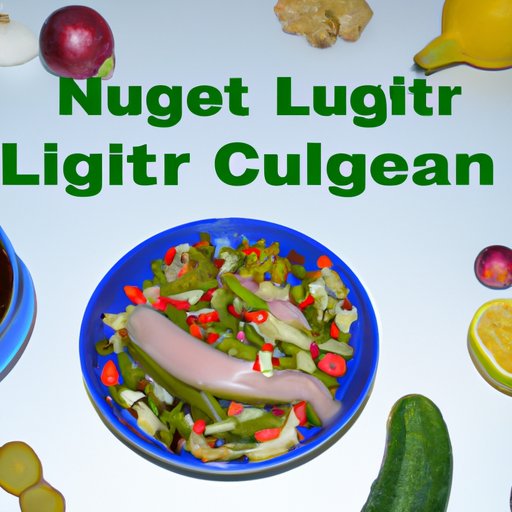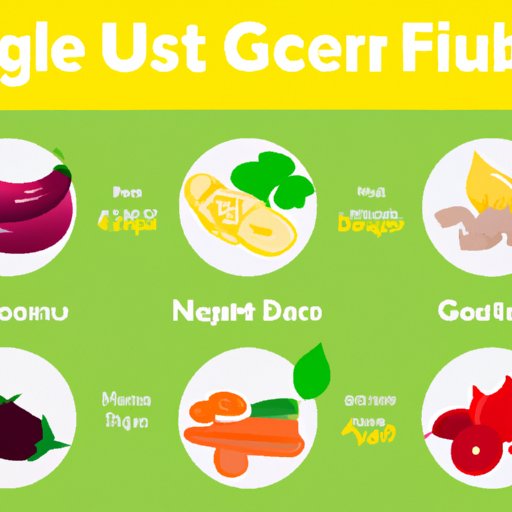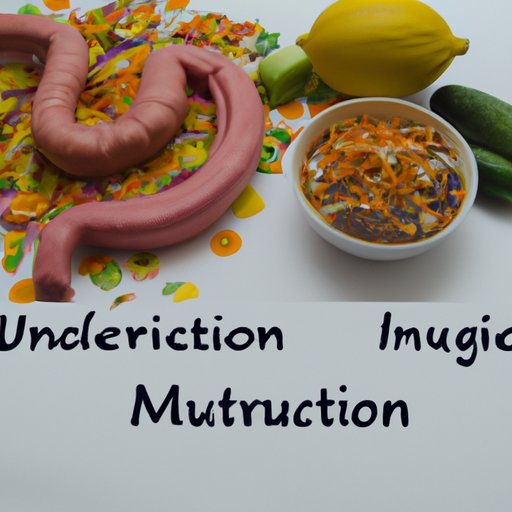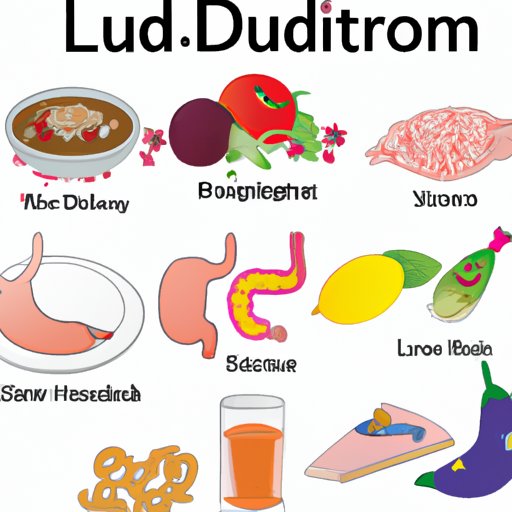Introduction
A stomach ulcer, or peptic ulcer, is a condition in which open sores form on the lining of the stomach and upper intestine. These sores can cause intense discomfort, pain, and even bleeding. In order to reduce symptoms and help the ulcer heal, it is important to make dietary changes that support a healthy digestive system. Eating for stomach ulcers involves both avoiding certain trigger foods and incorporating others into your diet.
Eating for Stomach Ulcers: Foods to Enjoy and Avoid
The best diet for stomach ulcers includes a variety of whole foods that are high in nutrients and easy to digest. It also means avoiding foods that may worsen symptoms or irritate the ulcer.
Foods to Enjoy
When eating for stomach ulcers, there are several types of food to focus on:
- Whole Grains: Whole grains like quinoa, oats, and brown rice are packed with fiber, vitamins, and minerals. They can help keep digestion regular and reduce inflammation.
- Lean Protein Sources: Lean proteins such as fish, chicken, and beans are an important part of any diet. They provide essential amino acids and help keep you feeling full.
- Fruits and Vegetables: Fruits and vegetables are loaded with antioxidants and other beneficial compounds. Fresh produce should be the cornerstone of any diet.
- Healthy Fats: Healthy fats like olive oil, avocado, and nuts can help reduce inflammation and improve digestion.
Foods to Avoid
In addition to focusing on eating certain foods, it is also important to avoid foods that may worsen symptoms or irritate the ulcer. These include:
- Processed and Refined Foods: Processed and refined foods like chips, cookies, and white bread can be hard to digest and may irritate the ulcer.
- High-Fat Foods: High-fat foods like red meat, cheese, and butter can increase acid production, making symptoms worse.
- Spicy Foods: Spicy foods can aggravate the ulcer and cause pain. It is best to avoid them as much as possible.
- Caffeine and Alcohol: Caffeine and alcohol can irritate the ulcer and worsen symptoms. It is best to limit or avoid these substances entirely.

A Comprehensive Guide to the Best Diet for Stomach Ulcers
There are two main dietary approaches for people with stomach ulcers: a low-acid diet and a bland diet. Let’s take a closer look at each one.
Low-Acid Diet
A low-acid diet is designed to reduce the amount of acid produced by the stomach. This can help reduce symptoms and promote healing. Here are some of the benefits of a low-acid diet:
- Benefits: A low-acid diet can help reduce symptoms and promote healing.
- Foods to Include: Foods to include in a low-acid diet are whole grains, lean proteins, fruits and vegetables, and healthy fats.
- Foods to Avoid: Foods to avoid are processed and refined foods, high-fat foods, spicy foods, caffeine, and alcohol.
Bland Diet
A bland diet is designed to reduce irritation to the stomach lining. This can help reduce symptoms and promote healing. Here are some of the benefits of a bland diet:
- Benefits: A bland diet can help reduce symptoms and promote healing.
- Foods to Include: Foods to include in a bland diet are cooked vegetables, cooked starches, lean proteins, and low-fat dairy products.
- Foods to Avoid: Foods to avoid are fried and fatty foods, carbonated beverages, cured meats, and dairy products.
How to Manage Your Diet to Help Manage a Stomach Ulcer
In addition to following a low-acid or bland diet, there are several lifestyle changes that can help manage a stomach ulcer:
- Eat Smaller Meals: Eating smaller meals more frequently can help reduce symptoms and promote healing.
- Chew Food Thoroughly: Chewing food thoroughly can help improve digestion and reduce discomfort.
- Avoid Trigger Foods: Avoiding trigger foods like caffeine, alcohol, and spicy foods can help reduce symptoms.
What Not to Eat When You Have a Stomach Ulcer
When eating for stomach ulcers, there are certain foods that should be avoided. These include:
- Fried and Fatty Foods: Fried and fatty foods can irritate the stomach lining and increase acid production.
- Carbonated Beverages: Carbonated beverages can irritate the stomach lining and increase acid production.
- Cured Meats: Cured meats are high in salt and fat and can irritate the stomach lining.
- Dairy Products: Dairy products can be difficult to digest and can worsen symptoms.

10 Healthy Food Choices for People with Stomach Ulcers
Here are 10 healthy food choices for people with stomach ulcers:
- Oatmeal: Oatmeal is a whole grain that is high in fiber and easy to digest.
- Bananas: Bananas are a nutrient-dense fruit that can help reduce inflammation.
- Salmon: Salmon is a lean protein source that is rich in omega-3 fatty acids.
- Broccoli: Broccoli is a nutrient-dense vegetable that can help reduce inflammation.
- Brown Rice: Brown rice is a whole grain that is high in fiber and easy to digest.
- Sweet Potatoes: Sweet potatoes are a nutrient-dense vegetable that can help reduce inflammation.
- Apples: Apples are a nutrient-dense fruit that can help reduce inflammation.
- Green Tea: Green tea is a low-caffeine beverage that is high in antioxidants.
- Almonds: Almonds are a healthy fat that can help reduce inflammation.
- Avocados: Avocados are a healthy fat that can help reduce inflammation.

The Role of Nutrition in Treating Stomach Ulcers
Nutrition plays an important role in treating stomach ulcers. Here are some of the ways nutrition can help:
- Nutrients That Can Help Heal Stomach Ulcers: Certain vitamins and minerals, such as zinc and vitamin A, can help promote healing.
- Supplements That May Help Reduce Symptoms: Certain supplements, such as probiotics and digestive enzymes, may help reduce symptoms.
- Dietary Changes to Help Manage Symptoms: Making dietary changes, such as following a low-acid or bland diet, can help manage symptoms.
An Overview of the Benefits of a Low-Acid Diet for Stomach Ulcers
A low-acid diet can be beneficial for people with stomach ulcers. Here are some of the benefits of a low-acid diet:
- Reduced Stomach Acid: A low-acid diet can help reduce the amount of acid produced by the stomach, which can help reduce symptoms.
- Reduced Pain and Discomfort: A low-acid diet can help reduce pain and discomfort caused by the ulcer.
- Improved Healing: A low-acid diet can help promote healing by reducing irritation to the stomach lining.
Conclusion
When eating for stomach ulcers, it is important to focus on eating a variety of whole foods and avoiding foods that may worsen symptoms. The best diets for stomach ulcers are low-acid and bland diets, both of which can help reduce symptoms and promote healing. Additionally, making lifestyle changes such as eating smaller meals and avoiding trigger foods can help manage symptoms. By following these tips, you can make dietary changes that support a healthy digestive system and help manage a stomach ulcer.
(Note: Is this article not meeting your expectations? Do you have knowledge or insights to share? Unlock new opportunities and expand your reach by joining our authors team. Click Registration to join us and share your expertise with our readers.)
